人教版九年级上册英语Unit1-7重点知识复习
九年级上册英语人教版笔记

九年级上册英语人教版笔记一、Unit 1 How can we become good learners?1. 重点单词。
- aloud:adv. 大声地;出声地。
例如:Read aloud so that we can all hear you.(大声朗读以便我们都能听到你。
)- pronunciation:n. 发音;读音。
Your pronunciation is very good.(你的发音很好。
)- patient:adj. 有耐心的;n. 病人。
Be patient with children.(对孩子们要有耐心。
)- expression:n. 表达(方式);表示。
Facial expressions can show our feelings.(面部表情能展示我们的感受。
)2. 重点短语。
- by doing sth.:通过做某事。
We can improve our English by reading English books.(我们可以通过读英语书提高英语。
)- make mistakes:犯错。
Everyone makes mistakes when they learn something new.(每个人在学习新东西的时候都会犯错。
)- look up:查阅;抬头看。
Look up the new word in the dictionary.(在词典里查阅这个新单词。
)3. 重点句型。
- How do you study for a test?(你如何为考试而学习?)- I study by working with a group.(我通过小组合作来学习。
)- The more you read, the faster you'll be.(你读得越多,你就会读得越快。
)二、Unit 2 I think that mooncakes are delicious!1. 重点单词。
九年级英语上册各单元知识点归纳

九年级英语上册各单元知识点归纳第一单元:基础知识1. 介词短语的使用:介词短语是由一个介词和它的宾语组成的短语,用来表示时间、地点、方向、原因等。
例如:"on the table"(在桌子上),"in the park"(在公园里)。
介词短语在句子中作状语、定语、宾语等。
需要注意介词与宾语之间的搭配。
2. 动词的时态和语态:英语中的动词有多种时态和语态。
常见的时态有一般现在时、一般过去时、一般将来时等。
常见的语态有主动语态和被动语态。
时态用于表示动作发生的时间,语态用于表示动作的执行者。
例如:"She is reading a book."(她正在读一本书)。
需要注意时态和语态的用法和变化规则。
3. 名词的单复数形式:英语中的名词有单数和复数形式。
复数形式一般是在名词后面加-s或-es。
有些名词的复数形式较特殊,需要记忆。
例如:"a cat"(一只猫)的复数形式是"cats"(多只猫)。
需要注意名词的单复数形式在句子中的搭配和用法。
第二单元:阅读理解1. 完型填空:完型填空是一种考察学生对语境理解和词汇运用能力的题型。
在完型填空中,通常给出一篇文章和一些空格,要求学生根据文章内容和语境选择正确的单词或短语填入空格中。
通常需要结合文章整体逻辑和上下文意义来填写正确答案。
2. 阅读理解题:阅读理解题是一种考察学生阅读理解能力和推理能力的题型。
通常会给出一篇短文或文章,然后根据文章内容提出一些问题,要求学生根据文章内容和推理来回答问题。
需要学会熟练阅读和理解文章,抓住关键信息和主题,并能运用推理等能力来回答问题。
第三单元:语法知识1. 直接引语和间接引语:在英语中,当我们引述别人的话时,可以使用直接引语和间接引语。
直接引语是直接引用别人所说的话,使用引号将其包围;间接引语是将别人所说的话转述出来。
例如:直接引语:"I am happy," she said.(她说:“我很开心。
人教版九年级英语上册各单元知识点归纳总结
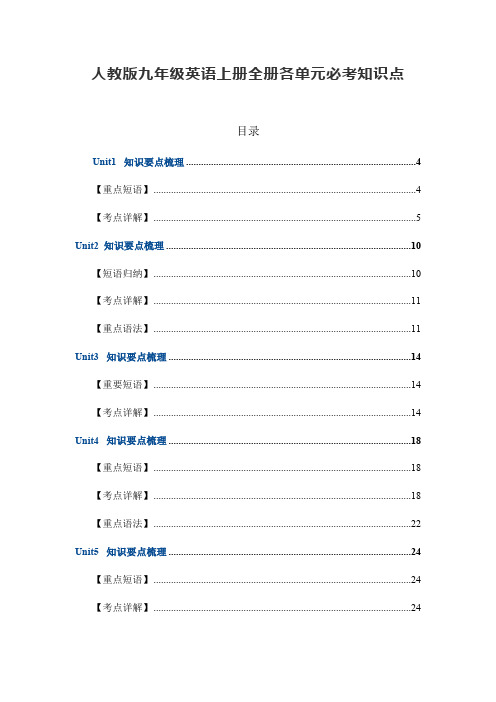
人教版九年级英语上册全册各单元必考知识点目录Unit1 知识要点梳理 (4)【重点短语】 (4)【考点详解】 (5)Unit2 知识要点梳理 (10)【短语归纳】 (10)【考点详解】 (11)【重点语法】 (11)Unit3 知识要点梳理 (14)【重要短语】 (14)【考点详解】 (14)Unit4 知识要点梳理 (18)【重点短语】 (18)【考点详解】 (18)【重点语法】 (22)Unit5 知识要点梳理 (24)【重点短语】 (24)【考点详解】 (24)【重点语法】 (27)Unit6 知识要点梳理 (30)【重点短语】 (30)【考点详解】 (30)【重点语法】 (33)Unit1 知识要点梳理【重点短语】1. have conversation with sb. 同某人谈话2. too…to… 太……而不能3. the secret to… ……的秘诀4. be afraid of doing sth./ be afraid to do sth. 害怕做某事5. look up 查阅6. repeat out loud 大声跟读7. make mistakes in 在……方面犯错误8. connect ……with… 把……和……连接/联系起来9. get bored 感到厌烦10. be stressed out 焦虑不安的11. pay attention to 注意;关注12. depend on 取决于;依靠13. the ability to do sth.. 做某事的能力【考点详解】1. by + doing 通过……方式(by是介词,后面要跟动名词,也就是动词的ing 形式)2. talk about 谈论,议论,讨论The students often talk about movie after class. 学生们常常在课后讨论电影。
talk to sb= talk with sb 与某人说话3. 提建议的句子:①What/ how about +doing sth.? 做…怎么样?(about后面要用动词的ing形式,这一点考试考的比较多)如:What/ How about going shopping?②Why don't you + do sth.? 你为什么不做…?如:Why don't you go shopping?③Why not + do sth. ? 为什么不做…?如:Why not go shopping?④Let's + do sth. 让我们做…...吧。
人教版初三九年级英语重点短语词组总结1-7单元
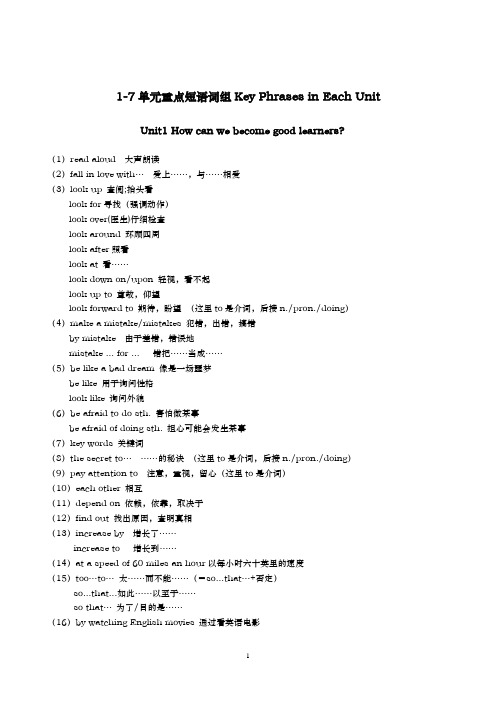
1-7单元重点短语词组Key Phrases in Each UnitUnit1 How can we become good learners?(1)read aloud 大声朗读(2)fall in love with… 爱上……,与……相爱(3)look up 查阅;抬头看look for寻找(强调动作)look over(医生)仔细检查look around 环顾四周look after照看look at 看……look down on/upon 轻视,看不起look up to 尊敬,仰望look forward to 期待,盼望(这里to是介词,后接n./pron./doing)(4)make a mistake/mistakes 犯错,出错,搞错by mistake 由于差错,错误地mistake ... for ... 错把……当成……(5)be like a bad dream 像是一场噩梦be like 用于询问性格look like 询问外貌(6)be afraid to do sth. 害怕做某事be afraid of doing sth. 担心可能会发生某事(7)key words 关键词(8)t he secret to… ……的秘诀(这里to是介词,后接n./pron./doing)(9)pay attention to 注意,重视,留心(这里to是介词)(10)each other 相互(11)depend on 依赖,依靠,取决于(12)find out 找出原因,查明真相(13)increase by 增长了……increase to 增长到……(14)at a speed of 60 miles an hour以每小时六十英里的速度(15)too…to…太……而不能……(=so...that…+否定)so...that...如此……以至于……so that… 为了/目的是……(16)by watching English movies 通过看英语电影by air /sea/train/ bus 乘飞机/船/火车/公共汽车by the window 在窗户旁边one by one 一个接一个by the way 顺便说下by oneself 单独,自己=(on one's own)Unit2 I think that mooncakes are delicious!(1)put on 增加(体重),发胖;穿上,戴上;举办,上演(2)lay out 摆开;布置(3)be similar to 与……相似(这里to是介词)be the same as 与……相同/一样(4)dress up 盛装打扮(5)not only…but also…不但……而且……(6)used to so sth. 过去常常做某事(7)remind sb. of sth. 提醒某人某事,使某人想起某事remind sb. to do sth. 提醒某人做某事(这里to是动词不定式)(8)care about 关心,在乎,介意care for 照料;照顾;喜欢(9)carry…to…把……带到……(这里to是介词)(10)end up 结束,告终end up with(接任何名词)以……结束end up in(接地点名词)end up doing 以做……结束(11)fly up to the moon 飞向月球(12)share…with sb. 与某人分享……(13)admire the moon 赏月(14)the spirit of………的精神(15)the true meaning of………的真正意义(16)business partner生意伙伴(17)warn sb. (not)to do sth. 警告某人(不要)做某事(18)promise sb. sth.承诺某人某事promise to do sth. 承诺做某事promise sb. (not) to do sth. 承诺/答应某人(不)做某事(19)celebrate sth. with sb. 与某人庆祝某事(20)spread love and joy 传播爱与快乐(21)hope/wish to do sth.希望做某事wish sb. to do sth.希望某人做某事(22)dress up 装扮,乔装打扮/盛装打扮dress up as…装扮成……,乔装打扮成……dress up in…穿上……(后接表示衣服或颜色的名词)(23)enjoy oneself过得愉快,玩得高兴=have a good time=have fun(24)not only...but also... 不但……而且……(就近原则)(25)used to do sth.过去常常做某事be used to do sth.某物被用来做某事be used to doing sth.某人习惯于做某事(这里to是介词)(26)what(+a/an)+形容词+名词(主语+谓语)!What a cold day(it is) today!What delicious food(it is)!how+形容词/副词+主语+谓语或how+形容词+a/an+单数可数名词+主语+谓语!How cold it is today! How nice a girl she is!Unit3 Could you please tell me where the restrooms are?(1)Water World/ Water Park水上世界/水上乐园(2)Amusement Park 游乐园(3)washroom/bathroom/toilet 洗手间(4)pass by 路过,经过(5)hold one’s hand 握住某人的手(6)rock band 摇滚乐队(7)pardon me 抱歉,对不起,什么,请再说一遍(8)Excuse me 对不起,打扰一下,借过(9)suggest doing sth. 建议做某事(10)prefer sth./doing sth. 宁愿,更喜欢prefer to do sth. 愿意做某事prefer (doing)sth. to (doing)sth.宁愿做......而不做...... (这里to是介词)prefer to do sth. rather than do sth.宁愿做......而不做......(11)depend on/upon 依靠、依赖、取决于It (all) depends. /That depends. 那要看情况/视情况而定(12)of course 自然,当然in the course of discussion 在讨论期间a matter of course 当然的事情(13)mean doing意味着mean to do sth.打算/企图做某事(14)Could you please (not)do sth. ?请你(不要)……好吗?(15)Would you please do sth.? 请你做某事好吗?Would you like to do sth.? 你愿意做某事吗?Would you mind doing sth.? 你介意做某事吗?Shall I/we do sth.? 让我/我们做某事好吗?Why not do sth.? 为什么不做某事呢?L et’s do sth. 让我们一起做某事吧?What/How about doing sth.? 做某事怎么样?(16)be sure to do sth.务必做某事,肯定做某事be sure of / about (doing) sth. 对做某事有把握(17)sb. spends + time/money+ (in) doing sth. /on sth. 某人花费时间或金钱做某事It takes sb. some time to do sth.做某事花费某人多少时间sb. pays + money+ for sth.某人为某物支付多少钱sth. costs sb. + money 某物花了某人多少钱Unit4 I used to be afraid of the dark.(1)in the end 最后(2)at the end of…在……末尾(3)by the end of …到……为止(4)make decisions/a decision 下决定,下决心(5)make up one’s mind to do sth. 下定决心做某事(6)take pride in sth. 为……感到自豪(7)be proud of sth. 以……而自豪be proud to do sth. 为做某事而骄傲(8)pay attention to sth./doing 对……注意,留心(9)be able to do sth. 能做某事(10)give up doing sth. 放弃做某事(11)不再①no more = no longer②not …any more = not …any longer(12)used to do sth 过去常常做某事(现在不做了)(句型变换即可借助于did,也可自变)be used to doing sth 某人习惯于做某事(这里to是介词)be used to do sth 某物被用来做某事(13)from time to time 时常,有时(=sometimes)(14)in person 亲身,亲自in public 公开地,当众in private 私底下,秘密地(15)deal with 对付,处理(16)take up 学着做,开始做(后接sth./doing)(17)in front of crowds/the public 在公众面前(18)worry about 担心(=be worried about)(19)hang out with friends 和朋友出去闲逛(20)a number of 许多……(后接可数名词复数作主语时谓语动词用复数)the number of ……的数量(后接可数名词复数作主语时谓语动词用单数)(21)be absent from classes 旷课(= be away from…)absent-minded adj. 心不在焉的(22)fail the exam 考试不及格pass the test 通过测试fail in sth.在某方面不成功fail to do sth. 不能做某事,没有做某事succeed in doing sth. 做某事很成功(23)all the time 一直,总是(=always)(24)change one’s life 改变某人的一生,改变生活(25)even though即使,纵然,尽管(=even if)(26)dare to do sth. 敢于做某事(作实意动词)dare do sth. (作情态动词)(27)always 总是,永远(频率为100%)usually 通常,平常(频率为80%)often 经常,常常(频率为60%)sometimes 有时(频率为40%)seldom 很少,不经常(频率为20%)never 从不,永不(频率为0%)(28)advise doing sth.建议做某事advise sb. to do sth. 建议某人做做某事a piece of/some advice一条/一些建议(advice不可数)suggest doing sth. 建议做某事give some suggestions 给出一些建议(suggestion可数)Unit5 What are the shirts made of?(1)according to 根据(这里to是介词)(2)in trouble 在困境中Don't trouble trouble until trouble troubles you. 不要自寻烦恼,不要庸人自扰(3)be covered with 被……覆盖(4)during the Spring Festival 春节期间(5)Chinese fairy tale 中国神话/童话故事(6)be made of 由……制成(制成品能看出原料)(7)be made from 由……制成(制成品看不出原料)(8)be made in 在……制造(in后接地点名词)(9)be made into 被制成(原材料作主语)(10)be made after 仿照……制成(11)be made by 由某人制作/用……方式制成(12)be made up of 由……组成consist of 包括,由……组成(无被动语态)(13)be famous for 因……而出名be famous as 作为……而出名(14)be good for+n./pron. 对……有好处/益处(↔be bad for对……有害处)be good to sb. 对某人好(↔be bad to sb. 对某人不好)be good at+n./pron./doing在……方面擅长(=do well in)be good with sb. 和某人相处得好;擅于和……相处(15)turn … into…把/使……变成……turn into 转变;变成;成为(16)special adj. 特殊的,特别的,专门的(↔ordinary)especial adj. 特别的,主要的,突出的(↔common)(17)both...and... 不但……而且……(连接主语时,谓语动词用复数形式)neither…nor…既不……也不……(连接主语时,谓语动词遵守就近原则)(18)look for寻找,强调的是找的动作或过程find 找到,强调的是找的结果,通常指偶然发现find out指经过观察、调查,把某事清楚、弄明白Unit6 When was it invented?(1)our daily/everyday life 我们的日常生活(2)have a point 有点道理,正确,中肯get to the point 说要点,言归正传(3)by accident 偶然,意外地(4)over the open fire 在火堆上(5)fall into the water 落入水中(6)take place (有计划地)发生(↔happen 偶然发生)(happen和take place均为不及物动词,无被动语态)take one’s place 代替某人的位置(=take the place of sb.)(7)without doubt 毫无疑问It's no doubt that… 某事是毫无疑问的(8)at a low price 以一个很低的价格(形容价格要用high/low,不能用expensive/cheap)(9)translate the book into different languages 把书翻译成不同种的语言(10)all of sudden 突然(=suddenly)(11)by mistake 错误地,无意中mistake…for… 把……错认为, 错把……当作(12)a much-loved and active sport 一个深受喜爱并且积极的运动(13)divide…into 把……分开be divided into… 被分成……(14)look up to 钦佩,仰慕(15)look down upon 轻视,看不起(16)at the same time 同时(=meanwhile adv. 同时,其间)(17)It is said that… 据说……(=Peopl e say that…)It is believed that… 人们认为……(=People believe that…)It is reported that… 据报道……It is supposed/thought that… 人们认为……It’s known that…众所周知……(18)national drink 国饮(19)be popular with 受……的欢迎the popularity of … ……的普及(20)tea culture 茶文化(21)invent 发明,发明之物,指“从无到有”discover发现,指“本来就已经存在,但不为人知”的事物find寻找,强调找的结果create指有目的地把原材料制成新产品,也指创造出原来不存在的或与众不同的事物invent→invention,inventordiscover→discovery(22)be pleased to do sth. 高兴做某事,be pleased with/ at /about 对……感到满意/高兴please(v.)→pleasure(n.), pleased (adj.)(23)各时态被动语态结构:①一般现在时的被动语态:am/ is/ are done②一般过去时的被动语态:was/ were done③一般将来时的被动语态:shall/will be done或be going to be done(注意There be句型的将来时为T here will be…/There is going to be…)④现在进行时的被动语态:am/is/are being done⑤过去进行时的被动语态:was/ were being done⑥现在完成时的被动语态:have/has been done⑦含有情态动词的被动语态:can/may/must/should be done(24)be used for被用来做某事be used as 被作为……使用be used by 被……使用be used to do sth. 被用来做某事(= be used for doing)Unit7 Teenagers should be allowed to choose their own clothes.(1)instead of 代替,而不是(介词短语)instead 反而,正相反(副词)(2)stay up late熬夜,睡得很晚(=burn the midnight oil)sleep late 睡懒觉oversleep 睡过头(3)concentrate on 集中注意力于,关注,专心做(4)have an opportunity to do sth. 有机会做某事(5)Old people's home 敬老院,养老院(6)(get)in the way(of)妨碍,挡道on the way 在去某地的路上by the way顺便说一声in a way 从某种意义上说Where there is a will, there is a way. 有志者,事竟成(7)at present 目前,现在(8)care about 关心,在乎,担心(9)get their ears pierced 穿耳孔get / have sth. done 让/使(别人)做某事(10)go out with their friends 和朋友一块出去(11)fail a test 考试不及格(12)the other day 前几天,不久前某一天(13)part-time jobs 兼职工作full-time jobs 全职工作(14)driver’s license 驾驶执照(=driving license)(15)seem to 好像(16)choose one’s own clothes 选择自己的衣服choose sth. for sb. 为某人选择某物choose sb. to do sth. 选择某人做某事(17)be strict with sb. in sth. 对某人在某方面要求严格(18)get to doing sth 着手做某事(19)attach/give importance to 对……给予重视place great importance on sth. 非常重视某事be very important=be of great importance 非常重要(20)keep doing sth. 继续干某事(不间断)keep on doing sth. 持续做某事keep...from doing sth. 阻止/防止……做某事(=prevent… from…)(21)by chance 偶然地,无意中the chance to do sth./of doing sth. 做某事的机会the chance of doing sth. 做某事的可能性(22)manage to do sth. 设法做成了某事try to do sth. 尽力做某事(不一定做成)(23)in support of 支持,证明(作状语)(24)dream of/about doing sth. 梦想/梦见做某事dream a dream 做梦(= have a dream)dream a bad dream 做恶梦=have a nightmare(25)put on 戴上,穿上,表示穿衣服的动作wear 穿着,戴着,强调状态dress穿着,打扮,但只用于穿衣,它既表示动作,又表状态dress sb / oneself 给某人/自己穿衣服be dressed in 穿着,正穿着(26)allow doing sth. 允许做某事allow sb. to do sth. 允许某人做某事be allowed to do sth. 被允许做某事。
人教版新目标九年级全册英语1-7单元语法知识点考点复习提纲(全面!)

人教版新目标九年级全册英语1-7单元语法知识点考点复习提纲Unit1 How can we become good learners?【重点短语】Section Amake word cards 制作词卡read the textbook 阅读课本listen to tapes 听磁带ask the teacher for help 求助老师study for a test 备考work with a group 小组合作have conversations with friends 和朋友们谈话read aloud 朗读improve speaking skills 提高口语技能give a report 作报告a slow reader 一个阅读速度慢的人get the main ideas 获取大意at first 起初;开始read word by word 逐字读word groups 意群be patient with sb. 对某人有耐心It takes time. 这得花时间 / 这得慢慢来。
be afraid to do / of doing sth. 害怕做某事poor pronunciation 发音不好fall in love with ... 爱上……body language 身势语;肢体语言the expression(s) on one’s face某人脸上的表情listen for the key words 留神听关键词as well 也the secret to ... ……的秘诀language learning 语言学习It’s a piece of cake.小菜一碟。
It serves you right. 你活该。
look up the word in a dictionary 在字典中查单词take notes 记笔记memorize sentence patterns 记忆句型do grammar exercises 做语法练习keep a diary in English 用英语记日记Section Bincrease reading speed 提高阅读速度make mistakes in grammar 在语法方面犯错be born with ... 天生具有……the ability to learn 学习的能力depend on 取决于;依赖learning habits 学习习惯have ... in common 有……共同之处create an interest in ... 对……产生兴趣pay attention to 注意;关注connect ... with ... 把……和……连接或联系起来learn from mistakes 从错误中学习think about 考虑Use it or lose it. 非用即失。
九年级上册每课的知识点

九年级上册每课的知识点九年级上册是初中最后一个学年的课程,它为高中的学习奠定了重要的基础。
下面将逐个课程进行分析,总结出每课的知识点。
第一课:《人教版九年级英语上册Unit 1 Friendship》这一课的主题是友谊,重点讲解了如何用英语介绍朋友以及分享朋友对自己的重要性。
学生需要学习相关的单词和句型,例如常见的交友方式和描述朋友的形容词。
第二课:《人教版九年级英语上册Unit 2 Welcome to the unit》这一课是关于英语课程的介绍,学生需要学习课堂用语和对话。
主要包括自我介绍、询问个人信息以及进行简单的交流。
此外,还需要掌握一些数字和时间的表达方式。
第三课:《人教版九年级英语上册Unit 3 Teenagers should be allowed to choose their own clothes》这一课主要讨论了青少年选择服装的权利。
学生需要学习表达意见的方式,包括就事实提出观点、阐述理由和提出建议。
同时,还需要掌握一些与衣物和时尚相关的词汇。
第四课:《人教版九年级英语上册Unit 4 What would you do》这一课主要讨论了在不同情境下应该如何采取行动。
学生需要学习表达假设、猜测和建议的句型,以及描述情境和解决问题的方法。
第五课:《人教版九年级英语上册Unit 5 Reading》这一课是一篇关于动物保护的文章。
学生需要学习阅读理解的技巧,包括如何提取关键信息、推理作者意图以及判断文章的结构。
第六课:《人教版九年级英语上册Unit 6 I'm going to study computer science》这一课主要讨论了未来的职业选择。
学生需要学习用be going to表示未来计划的用法,并能够描述自己的未来职业和理想。
第七课:《人教版九年级英语上册Unit 7 Why don't you get her a scarf》这一课主要谈论了购物和赠送礼品的建议。
人教版九年级英语上册各单元知识点汇总

人教版九年级英语上册各单元知识点汇总UNIT1 How can we become good learners?SectionA重点单词听,并跟读下列单词l. textbook n.教科书;课本2. conversation n.交谈;谈话3. aloud adv.大声地;出声地4. pronunciation n.发音;读音5. sentence n.句子6. patient adj.有耐心的n.病人7. expression n.表情;表示;表达方式8. discover v.发现;发觉9. secret n.秘密;秘诀adj.秘密的;保密的10. grammar n.语法l1. repeat v.重复;重做l2. note n.笔记;记录v.注意;指出13. pal n.朋友;伙伴14. chemistry n.化学15. memorize v.记忆;记住16. pattern n.模式;方式听,并跟读下列单词变形。
l. conversation —converse (v.会话)2. patient —patience (n.耐心)3. expression —express (v.表达)1. discover —discovery ( n.发现)5. improve —improvement( n.改善)重点短语听,并跟读下列短语。
l. make word cards 制作单词卡片2. ask sb. for ... 向某人寻求……3. have conversations with sb. 和某人谈话4. at first 起初, 起先5. give a report 做报告6. take notes 记/做笔记7. word by word 逐词地8. so... that 如此……以至于9. write e-mails to sb. 给某人写电子邮件10. be afraid to do sth. /be afraid of doing sth.害怕做某事11. because of 由于;因为12. fall in love with 爱上13. a piece of cake 小菜一碟14. look up( 在词典、参考书中或通过电脑)查阅;抬头看15. so that 以便重点句型听,并跟读下列句子。
最全面人教版九年级上册英语各单元知识点总复习归纳总结

最全面人教版九年级上册英语各单元知识点总复习归纳总结Unit 1: Hello!- Greetings and introductions: Learn how to greet people and introduce yourself.- Numbers: Practice numbers and learn how to say and write them.- Personal information: Learn how to ask and answer questions about personal information like name, age, and nationality.Unit 2: How Do You Study for a Test?- Study methods: Learn different ways to study for tests and improve learning efficiency.- Time management: Understand the importance of time management in studying.- Test preparation: Learn strategies for preparing effectively for exams.- Giving advice: Practice giving and receiving study advice using modal verbs.Unit 3: What Are You Doing for Vacation?- Vacation plans: Learn how to talk about your plans for the vacation.- Leisure activities: Discuss different leisure activities and preferences.- Present continuous tense: Understand and use the present continuous tense to talk about present actions.- Future plans: Express future plans and intentions using "be going to" and present continuous tense.Unit 4: I Used to Be Afraid of the Dark.- Past experiences: Learn how to talk about past experiences using "used to" and simple past tense.- Phobias and fears: Discuss different phobias and fears people may have.- Narrative tenses: Understand and use narrative tenses to talk about past events.Unit 5: What is the highest mountain in the world?- Geography and landmarks: Learn about different geographical features and famous landmarks.- Describing places: Practice describing different places using adjectives.- Research skills: Learn how to conduct research and gather information about different topics.Unit 6: Why don't you get her a scarf?- Giving suggestions: Practice suggesting and responding to suggestions.- Gift ideas: Discuss different gift ideas for various occasions.- Buying clothes: Learn how to describe and buy clothes in a store.- Preferences: Express personal preferences and opinions using adjectives.Unit 7: Teenagers should be allowed to choose their own clothes.- Rules and regulations: Discuss rules and regulations for teenagers.- Arguments for and against: Present arguments for and against a given topic.- Writing an opinion article: Learn how to write an opinion article expressing personal views.- Persuasive language: Use persuasive language to convince others of a certain viewpoint.Unit 8: I'll help clean up the city parks.- Volunteering: Discuss different volunteer activities and their benefits.- Environmental issues: Learn about environmental problems and ways to address them.- Expressing willingness: Use "will" and "be willing to" to express willingness to help.- Making suggestions: Practice making suggestions on how to improve the environment.Unit 9: What does he look like?- Physical appearance: Learn vocabulary to describe people's physical appearance.- Personality traits: Discuss different personality traits and their impact on people's lives.- Describing people: Practice describing people using adjectives and sentence structures.- Role plays: Act out different scenarios and describe the characters involved.以上是最全面人教版九年级上册英语各单元知识点的总复习归纳总结。
人教版九年级上学期英语期末复习: Unit 1- Unit 8 重要知识点提纲(全面!)
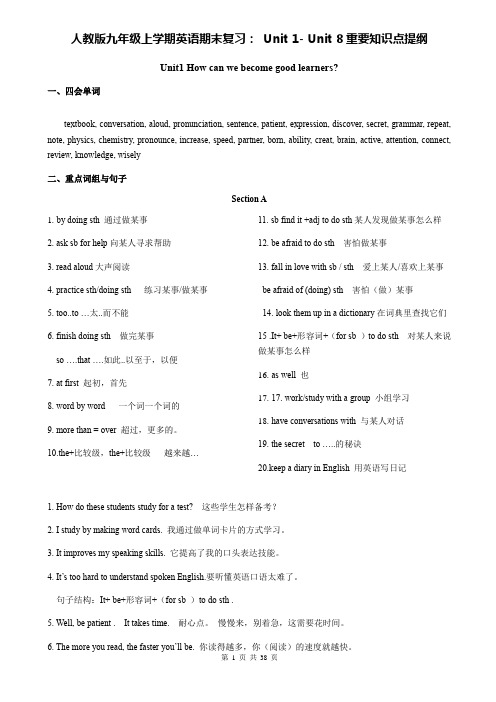
人教版九年级上学期英语期末复习:Unit 1- Unit 8重要知识点提纲Unit1 How can we become good learners?一、四会单词textbook, conversation, aloud, pronunciation, sentence, patient, expression, discover, secret, grammar, repeat, note, physics, chemistry, pronounce, increase, speed, partner, born, ability, creat, brain, active, attention, connect, review, knowledge, wisely二、重点词组与句子Section A1.by doing sth 通过做某事2. ask sb for help向某人寻求帮助3. read aloud大声阅读4. practice sth/doing sth 练习某事/做某事5. too..to …太..而不能6. finish doing sth 做完某事so ….that ….如此..以至于,以便7. at first 起初,首先8. word by word 一个词一个词的9. more than = over 超过,更多的。
10.the+比较级,the+比较级越来越… 11. sb find it +adj to do sth某人发现做某事怎么样12. be afraid to do sth 害怕做某事13. fall in love with sb / sth 爱上某人/喜欢上某事be afraid of (doing) sth 害怕(做)某事14. look them up in a dictionary在词典里查找它们15 .It+ be+形容词+(for sb )to do sth 对某人来说做某事怎么样16.as well 也17.17. work/study with a group 小组学习18.have conversations with 与某人对话19. the secret to …..的秘诀20.keep a diary in English 用英语写日记1. How do these students study for a test? 这些学生怎样备考?2. I study by making word cards. 我通过做单词卡片的方式学习。
人教版九年级英语全册各单元知识点总结
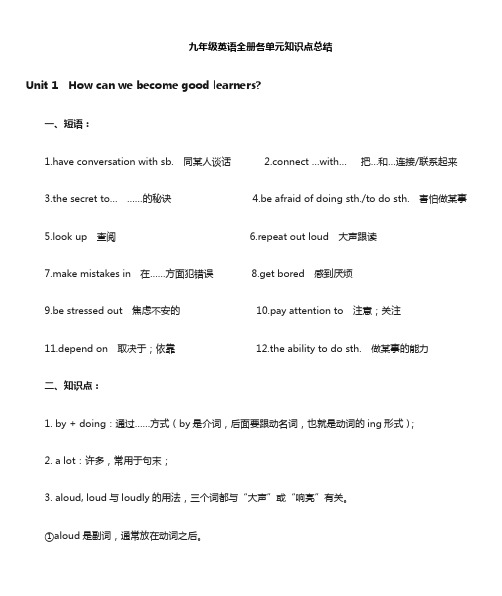
九年级英语全册各单元知识点总结Unit 1 How can we become good learners?一、短语:1.have conversation with sb. 同某人谈话2.connect …with… 把…和…连接/联系起来3.the secret to… ……的秘诀4.be afraid of doing sth./to do sth. 害怕做某事5.look up 查阅6.repeat out loud 大声跟读7.make mistakes in 在……方面犯错误8.get bored 感到厌烦9.be stressed out 焦虑不安的10.pay attention to 注意;关注11.depend on 取决于;依靠12.the ability to do sth. 做某事的能力二、知识点:1. by + doing:通过……方式(by是介词,后面要跟动名词,也就是动词的ing形式);2. a lot:许多,常用于句末;3. aloud, loud与loudly的用法,三个词都与“大声”或“响亮”有关。
①aloud是副词,通常放在动词之后。
②loud可作形容词或副词。
用作副词时,常与speak, talk, laugh等动词连用,多用于比较级,须放在动词之后。
③loudly是副词,与loud同义,有时两者可替换使用,可位于动词之前或之后。
4. not …at all:一点也不,根本不,not经常可以和助动词结合在一起,at all 则放在句尾;5. be / get excited about sth.:对…感到兴奋;6. end up doing sth:终止/结束做某事;end up with sth.:以…结束;7. first of all:首先(这个短语可用在作文中,使得文章有层次);8. make mistakes:犯错make a mistake 犯一个错误;9. laugh at sb.:笑话;取笑(某人)(常见短语)10. take notes:做笔记/记录;11. native speaker 说本国语的人;12. make up:组成、构成;13. deal with:处理、应付;14. perhaps = maybe:也许;15. go by:(时间)过去;16.each other:彼此;17.regard… as … :把…看作为…;18.change… into…:将…变为…;19. with the help of sb. = with one's help 在某人的帮助下(注意介词of和with,容易出题)20. compare … to …:把…比作… compare with 拿…和…作比较;21. instead:代替,用在句末,副词;instead of sth / doing sth:代替,而不是(这个地方考的较多的就是instead of doing sth,也就是说如果of后面跟动词时,要用动名词形式,也就是动词的ing形式)22.Shall we/ I + do sth.? 我们/我…好吗?23. too…to:太…而不能,常用的句型是too+形容词/副词+ to do sth.Unit 2 I think that moon cakes are delicious!一、短语:1. the Lantern Festival 元宵节2. the Dragon Boat Festival 端午节3. the Water Festival 泼水节4. remind sb. of 使某人想起5. eat five meals a day 一天吃五餐6. put on five pounds 体重增加了五磅7. treat sb. with. 用/以……对待某人8. be similar to... 与.......相似9. end up 最终成为/处于10. share sth. with sb. 与……分享……11. as a result结果12. one... the other... (两者中的) 一个…另一个…13. take sb. out for dinner 带某人出去吃饭14. dress up 乔装打扮15. haunted house 鬼屋16. the beginning of new life 新生命的开始二、知识点:1.宾语从句:(三大考点:引导词、时态和语序。
最新人教版九年级英语上册单元知识归纳全册

最新人教版九年级英语上册单元知识归纳全册Unit 1 How can we become good learners?单元知识点归纳Section A(1a-2d)必背单词1.improve v. 提高,改善→improve sth. 提高某方面2.conversation n.交谈;谈话→have conversations with sb. 与某人交谈/谈话3.aloud adv.大声地;出声地→read aloud大声读;loudly→ talk loudly大声说话4.pronunciation n.发音;读音→ get the pronunciation right使得发音正确;pronounce v.发音→ pronounce the word发这个单词的音5.patient adj. 有耐心的n.病人→be patient with sb.对某人有耐心6.textbook n.教科书;课本7.sentence n. 句子必背短语8.by asking the teacher for help通过向老师寻求帮助9.by working with a group 通过小组合作10.study for a test 为考试而学习11.word by word 逐字必背句子12. I've learned a lot that way. 我用那种方法学到很多。
13. It really improves my speaking skills.它确实提高了我的口语能力。
14. It's too hard to understand spoken English.听懂英语口语很难。
15.It takes time.这需要时间。
16. The more you read,the faster you'll be.你读得越多,你将会越快。
Section A(3a-4c)必背单词1. expression n.表情;表示;表达方式→ express v.表达;表露2.discover v. 发现;发觉→discovery n.发现3.repeat v. 重复;重做4.secret n.秘密;秘诀adj.秘密的;保密的5.note n.笔记;记录→ take notes 记笔记v.注意;指出6.physics n.物理;物理学7.chemistry n. 化学8.grammar n. 语法必背短语9.be afraid to害怕10. fall in love with 爱上……11.look up (在词典或参考书中)查阅;抬头看→look it up12. because of因为必背句子13.The teacher spoke so quickly that I did not understand her most of the time.老师说得太快,以至于很多时候我都听不懂。
人教版(新目标)初三复习九年级unit1-8重点知识梳理
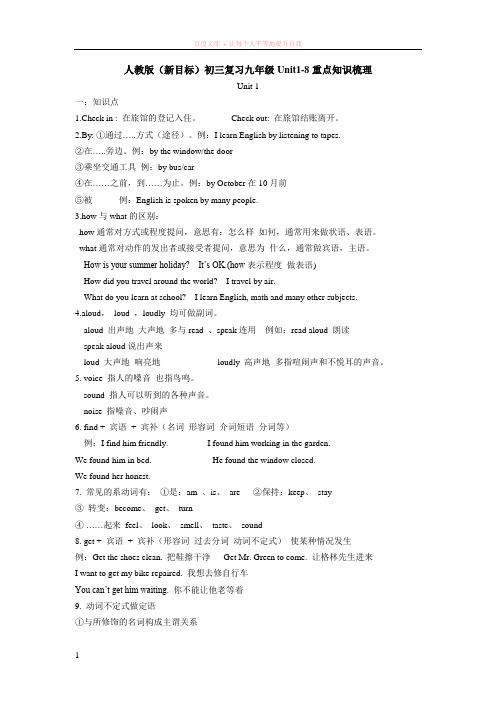
人教版(新目标)初三复习九年级Unit1-8重点知识梳理Unit 1一:知识点1.Check in : 在旅馆的登记入住。
Check out: 在旅馆结账离开。
2.By: ①通过…..方式(途径)。
例:I learn English by listening to tapes.②在…..旁边。
例:by the window/the door③乘坐交通工具例:by bus/car④在……之前,到……为止。
例:by October在10月前⑤被例:English is spoken by many people.3.how与what的区别:how通常对方式或程度提问,意思有:怎么样如何,通常用来做状语、表语。
what通常对动作的发出者或接受者提问,意思为什么,通常做宾语,主语。
How is your summer holiday? It’s OK.(how表示程度做表语)How did you travel around the world? I travel by air.What do you learn at school? I learn English, math and many other subjects.4.aloud,loud ,loudly 均可做副词。
aloud 出声地大声地多与read 、speak连用例如:read aloud 朗读speak aloud说出声来loud 大声地响亮地loudly 高声地多指喧闹声和不悦耳的声音。
5. voice 指人的嗓音也指鸟鸣。
sound 指人可以听到的各种声音。
noise 指噪音、吵闹声6. find + 宾语+ 宾补(名词形容词介词短语分词等)例:I find him friendly. I found him working in the garden.We found him in bed. He found the window closed.We found her honest.7. 常见的系动词有:①是:am 、is、are ②保持:keep、stay③转变:become、get、turn④……起来feel、look、smell、taste、sound8. get + 宾语+ 宾补(形容词过去分词动词不定式)使某种情况发生例:Get the shoes clean. 把鞋擦干净Get Mr. Green to come. 让格林先生进来I want to get my bike repaired. 我想去修自行车You can’t get him waiting. 你不能让他老等着9. 动词不定式做定语①与所修饰的名词构成主谓关系The next train to arrive was from New York. He is always the first to come.②与所修饰的名词构成动宾关系I have nothing to say. I need a pen to write with.I need some paper to write on. I don’t have a room to live in.10. practice , fun 做名词为不可数名词11. add 补充说又说12. join 加入某团体并成为其中一员attend 出席参加会议或讲座join in与take part in指参加到某项活动中去。
人教版初三英语上册全册各单元知识点汇总

九年级英语上册全册各单元知识点汇总Unit 1 How can we become good learners? 短语总结:1.good learners优秀的学习者2.work with friends和朋友一起学习3.study for a test备考4.have conversations with与……交谈5.speaking skills口语技巧6.a little有点儿7.at first起初起先8.the secret to......,.......的秘诀9.because of因为10.as well也11.look up(在词典中等)查阅;抬头看12.so that以便,为了13.the meaning of……的意思14.make mistakes犯错误15.talk to交谈16.depend on依靠依赖17.in common共有的18.pay attention to注意关注19.connect……with……把……联系。
20.for example例如21.think about考虑22.even if即使尽管纵容23.look for寻找24.worry about担心担忧25.make word cards制作单词卡片26.ask the teacher for help向老师求助27.read aloud大声读28.spoken english英语口语29.give a report作报告30.word by word一字一字地31.so……that如此……以至于32.fall in love with爱上33.something interesting有趣的事情34.take notes记笔记35.how often多久一次36.a lot of许多37.the ability to do sth.做某事的能力38.learning habits学习习惯39.be interested in对……感兴趣40.get bored感到无聊41.be good at在……方面擅长42.be afraid of害怕43.each other彼此互相44.instead of代替而不是二.句型用法1.by doing sth通过做某事2.it+be+adj+to do sth做某事是……的3.finish doing sth完成某事4.what about doing sth?做某事怎么样?5.try to do sth尽力做某事6.the+比较近,the+比较近越……,就越……7.find it+adj+to do sth发现做某事8.be afraid of doing sth害怕做某事9.help sb(to)do sth帮助某人做某事10.practice doing sth练习做某事11.keep doing sth一直做某事12.be afraid to do sth害怕做某事13.begin to do sth开始做某事14.want to do sth想要做某事15.need to do sth需要做某事16.remember to do sth记得做某事17.shoot射(射着,射死等表结果)18.shoot at(瞄准)射Unit 2 I think that mooncakes are delicious!一.重点短语1.put on增加(体重)发胖2.care about关心在乎3.end up最终成为,最后处于4.not only……but also……不但……而且……5.shoot down射下ed to do过去常常做……7.remind sb.of使某人想起8.give out分发发放9.the water festival泼水节10.the Chinese spring festival中国春节11.next year明年12.sound like听起来像13.each other互相彼此14.in the shape of以……的形状15.on mid-autumn night在中秋之夜16.fly up to飞向y out摆开布置e back回来19.as a result结果因此20.mother's day母亲节21.more and more popular越来越受欢迎22.think of想起认为思考23.dress up装扮穿上盛装24.the importance of……的重要性25.make money挣钱26.in need需要帮助处于困境中27.between……and……在……和……之间28.the dragon boat festival龙舟节29.the lantern festival元宵节30.like best最喜欢31.go to……for a vacation去……度假32.be similar to与……相似33.wash away冲走洗掉34.mid-autumn festival中秋节35.shoot down射下36.call out大声呼喊37.the tradition of……的传统38.at night在夜里在晚上39.one……,the other……一个……,另一个…40.Father‘s day父亲节41.have to必须不得不42.play a trick on sb捉弄某人43.the spirit of……的精神44.care about关心45.wake up醒来46.the beginning of……的开始二.句型用法1.感叹句式一:What+(a/an)+adj+名词(+主语+谓语+其他)!多么……的……感叹句式二:How+adj/adv+主语+谓语+其他!……多么……!2.in+时间段在……后3.give sb.sth.给某人某物4.plan to do sth计划做某事5.refuse to do sth拒绝做某事6.one of+名词复数形式……之一7.it+is+名词+动词不定式(to do sth)做某事是…8.what…think of…?认为…怎么样?9.make sb do sth让某人做某事ed to be过去是……11.warn sb(not)to do sth告诫某人做某事12.tell sb(not)to do sth告诉某人做某事13.decide to do sth决定做某事14.promise to do sth承诺、答应做某事三.语法知识点.1.宾语从句一.连词a.陈述语序(that)b.一般疑问句(if或whether)c.特殊疑问句(5w,1h)二.陈述语序三.时态可跟that从句做宾语的动词:say,think,insist,wish,hope,demand,imagine,wonder,know,see,believe,agr ee,admit,deny,expect,explain,order,command,feel,dream,suggest,hear,me an,notice,prefer,request,require,propose,declare,report等例:I don't know what they are looking for.Could you tell me when the train will leave?注意:当主句谓语动词是think,believe,suppose,expect等词,而宾语从句的意思是否定时,常把否定转移至主句表示。
人教版英语九上各单元重要语法知识点

人教版英语九上各单元重要语法知识点在学习英语时,语法是一个非常重要的环节。
掌握好英语的语法知识,对于提高英语水平有着非常重要的作用。
下面将分别介绍人教版英语九上各单元的重要语法知识点,希望能够对大家有所帮助。
第一单元重点语法知识点:动词的时态1. 一般现在时:表示经常性或习惯性的动作,也可用于表示客观事实、真理、格言、警句等。
2. 一般过去时:表示过去某个时间发生的动作,或者过去常常发生的动作,也可用于表示过去的状态和习惯。
3. 一般将来时:表示将来某个时间将要发生的动作或情况,还可以表示计划、安排和意图等。
第二单元重点语法知识点:形容词和副词的比较级和最高级1. 形容词的比较级:在两个人或事物之间进行比较时,用来表示一个比另一个更高一些的程度。
2. 形容词的最高级:用来表示三者及三者以上的人或事物相互比较,表示最高程度。
3. 副词的比较级和最高级:和形容词的比较级和最高级用法相似,主要用于修饰动词、形容词和其他副词。
第三单元重点语法知识点:动词不定式1. 作宾语:作为动词的宾语,通常用动词不定式的基本形式。
2. 作宾语补足语:常用在某些及物动词之后,表示宾语的具体内容。
3. 作状语:通常用于说明谓语动词的动作的目的或意图。
第四单元重点语法知识点:定语从句1. 修饰名词或代词:用来对名词或代词进行修饰,一般用在被修饰的名词或代词之后。
2. 关系代词和关系副词:在定语从句中,关系代词有that, which, who, whom, whose等;关系副词有where, when, why等。
3. 关系代词和关系副词在定语从句中的使用。
第五单元重点语法知识点:情态动词1. can/could:表示能力、许可、请求;can用于一般现在时,could 用于一般过去时。
2. may/might:表示可能、许可、请求;may用于一般现在时,might用于一般过去时。
3. must:表示推测、肯定、命令等意义;只能用于一般现在时。
初中英语人教版九年级1-7单元课文重点梳理+单元强化练习,中考复习导学案

个体差异性辅导学案(学生版)姓名/班型初三班课年级九年级课次13 学习主题九年纪1-7单元课文重点梳理重难点知识1、单元重点词汇复习2、It is +adj. + of sb. to do sth. / It is +adj. +for sb. to do sth.辨析2、be +adj. +enough + to do3、Would rather….句型的用法和Prefer(=like…better)以及p refer…to…的用法,由some, any ,no, every.构成的复合不定代词的用法等4、单元重点语法复习学习过程Unit 1 How can we become good learners?一、单元词组、短语1. have conversation with sb.同某人谈话2. too…to… 太……而不能3. the secret to… ……的秘诀4. be afraid of doing sth./ be afraid to do sth. 害怕做某事5. look up 查阅6. repeat out loud大声跟读7. make mistakes in在……方面犯错误8. connect ……with… 把……和……连接/联系起来9. get bored 感到厌烦10. be stressed out 焦虑不安的11. pay attention to 注意;关注12. depend on 取决于;依靠13. the ability to do sth.. 做某事的能力用法归纳1.by + doing :通过……方式(by是介词,后面要跟动名词,也就是动词的ing形式)2.提建议的句子:①What/ how about +doing sth.? 做…怎么样?(about后面要用动词的ing形式,这一点考试考的比较多)如:What/ How about going shopping?②Why don't you + do sth.?你为什么不做…?(注意加黑的部分用的是动词的原型)如:Why don't you go shopping?③Why not + do sth. ? 为什么不做…?(注意加黑的部分用的是动词的原型)如:Why not go shopping?④Let's + do sth.让我们做…吧(注意加黑的部分用的是动词的原型)如:Let's go shopping⑤Shall we/ I + do sth.? 我们/我…好吗?如:Shall we/ I go shopping?单元强化练习:()1.-_____________do you tell your mother about your English result?-By using my mobile phone.A.WhatB.HowC.WhyD.Where()2.-How ________ do you go to movies?-Once a month.A.oftenB.longC.farD.old()3.What are we going ____________?What about _________ some orange juice?A.drinking;getB.drink;gettingC.to drink;gettingD.drink;get()4.He talked too fast and I _________ understand every word.A.shouldn’tB.can’tC.littleD.a little()5.I think reading English aloud helps __________.A.a fewB.fewC.couldn’tD.haven’t()6.Jim has fun ___________ Chinese during in China.A.learnB.to learnC.learningD.learns()7._____________ the help of the teacher,he became a good student.A.UnderB.OnC.WithD.In()8.You’d better not always look up the new words ______ the dictionary while reading.Sometimes we need to guess.A.inB.onC.atD.from()9.It’s important _________ the piano well.A.of him to playB.for him to playC.of him playingD.for him playing ()10.-Did you have any problems in London?-- Yes,___________ Chinese food like rice,noodles and dumplings.A.findB.foundC.findingD.to find()11.You’d better _________ her number in the phone book.A.look intoB.look forC.look upD.look on()12.You are weak in English.I think you’d better ________ ABC.A.end up withB.go on withC.begin withD.get with()13.-Have you decided ________ on the coming vacation?-Not yet.. Maybe somewhere cool.You know I don’t like the heat.A.where to goB.how to doC.when to goD.what to do()14.-Do you ____________ hold such parties?-Yes,every Saturday.A.alwaysuallyC.oftenD.hardly()15.Ms Liu is a teacher we like to _________,because she can always give us advice.A.find outB.look forC.talk aboutD.talk with1-5 B A C C D 6 -10 C C A B C 11-15 C C A C DUnit 2 I think that moon cakes are delicious!短语归纳1. the Lantern Festival 元宵节2. the Dragon Boat Festival 端午节3. the Water Festival 泼水节4. be fun to watch 看着很有意思5. eat five meals a day 一天吃五餐6. put on five pounds 体重增加了五磅7. in two weeks 两星期之后8. be similar to... 与....相似9. end up最终成为;最后处于10. share sth. with sb. 与…分享…11. as a result结果12. One...the other... (两者中的)一个…另一个…13. take sb. out for dinner 带某人出去吃饭14. dress up 乔装打扮15. haunted house 鬼屋16. call out 大声呼喊17. remind sb. of 使某人想起18. sound like 听起来像19. treat sb. with. 用/以……对待某人20. the beginning of new life 新生命的开始【语法归纳】一、宾语从句二、感叹句单元强化练习:( )1. My brother often helps me with my study,although he is quite busy with his ________ every day.A. businessB. treatC. poundD. present( ) 2. -—Could you tell me something about the boy who helped you just now?—Sorry. I know nothing about him. We are ________.A. friendsB. neighborsC. classmatesD. strangers( ) 3. -—Do you have ________ in Beijing?—Yes. My aunt and uncle live there.A. classmatesB. cousinsC. partnersD. relatives( ) 4. We bought Lucy an e-dictionary and ________ ,she worked harder than before.A. for exampleB. compared withC. as a resultD. in fact( ) 5. My father has ________ me about my homework. I have to be more careful.A. warnedB. helpedC. followedD. took( ) 6. —________ lovely day it is today!—Yes. Let's go out and enjoy the sunshine!A. How aB. What aC. HowD. What( ) 7. ________ do you like best about the Lantern Festival?—I like the lanterns. I think they are fun ________.A. What;to watchB. What;watchingC. How;to watchD. How;watching ( )8.—The dragon boat races are so exciting, but our boat is still behind.—Don't worry. I am sure ________ our team will win!A. ifB. thatC. whetherD. why( )9.With the help of the doctor,the boy ________ a healthy child.A.came outB. ended upC. put onD. took off( ) 10. Do you know ________ Hangzhou or not tomorrow?A.whether are they leaving forB. whether they are leaving forC. if they are leaving forD. if are they leaving for1-5 ADDCA 6-10 BABBBUnit 3 Could you please tell me where the restrooms are?1. used to 过去常常2. be afraid of 害怕3. From time to time 时常;有时4. turn red 变红5. take up 开始做6. deal with 对付;应付7. not…anymore 不再8. tons of attention 很多关注9. worry about 担心10. be careful 当心11. hang out 闲逛12. give up 放弃13. thank about 考虑14. a very small number of… 极少数的……15. be alone 独处16. give a speech 做演讲17. make a telephone call 打电话18. save money 省钱、存钱语法点单元强化练习:( ) 1.—Jim enjoys listening to pop music. ______________.A. So does Helen.B. Also is HelenC. Helen likes alsoD. SoHelen does( ) 2. Our English teacher is very strict _______ us and he is strict ________his teaching.A.with, atB. with, withC. at, atD. with, in( ) 3. -—What’s the matter?———They said I should not be allowed here. They don’t allow ______in the waiting room.A. smoking, to smokeB. to smoke, smokeC. to smoke, smokingD. smoking, smoking( ) 4. He doesn’t do his homework ______________, though he has __________.A.carefully enough, enough timeB. enough carelessly, time enoughB.carelessly enough, enough time D. enough carefully, enough time( ) 5. The little child was too _____________ to hear the end of the long speech.A. sleepyB. asleepC. sleepD. sleeping( ) 6. Everyone ____________to have at least eight__________sleep at night.A.needs, hour’sB. need, hours’C. needed, hour’sD. needs, hours’( ) 7. We should go to school at 8:00 ______________ school mornings.A. atB. inC. onD. of( ) 8. Something is wrong with my PDA.I will get it ___________ .A. repairB. repairingC. to repairD. repaired( ) 9. ——Excuse me, you are _________ of my passing through. ————I’m sorry, here you go.A. on the wayB. in the wayC. out the wayD. off the way( ) 10. Jill didn’t finish the homework,_________.A.eitherB.tooC.alsoD.neith1—5. ADCAA 6—10. DCDBAUnit 4 I used to be afraid of the dark.短语归纳1. be more interested in 对…更感兴趣.2. on the swim team 游泳队的队员.3. be terrified of 害怕...4. gym class 体操课.5. worry about 担心6. all the time 一直, 总是7. chat with 与…闲聊8. hardly ever 几乎从不9. walk to school = go to school on foot 步行去上学take the bus to school = go to school by bus 乘车去上学语法点:1. used to do sth. 过去常常做某事(这个知识点考的很多,大家要注意这个短语的意思,还要记着used 后面用的是不定式to do)如:He used to play football after school. 放学后他过去常常踢足球。
初三九年级人教版英语1-7单元知识点总结

unit 1 How can we bee good learners?必背单词aloud 大声地出声地patient 有耐心的病人discover 发现pronounce [prəˈnaʊns] v.发音pronunciation [prəˌnʌnsiˈeɪʃn] n. 发音ability 能力才能active活跃的积极的expression 表情,表示表达方式secret 秘密秘诀 adj秘密的保密的increase 增加增长knowledge 知识学问短语归纳work with friends 和朋友一起学习listen to tapes 听磁带study for a test 备考have conversations with 与……交谈speaking skills 口语技巧a little 有点儿at first 起初起先the secret to......, .......的秘诀because of 因为as well 也look up (在词典中等)查阅;抬头看so that 以便,为了the meaning of ……的意思make mistakes 犯错误talk to 交谈depend on 依靠依赖in mon 共有的pay attention to 注意关注connect ……with ……,把……和……联系或连接起来for example 例如think about 考虑even if 即使尽管纵容look for 寻找find out 找到查明worry about 担心担忧make word cards 制作单词卡片ask the teacher for help 向老师求助read aloud 大声读spoken english 英语口语give a report 作报告word by word 一字一字地so……that 如此……以至于fall in love with 爱上something interesting 有趣的事情take notes 记笔记how often 多久一次a lot of 许多the ability to do sth. 做某事的能力learning habits 学习习惯be interested in 对……感兴趣get bored 感到无聊be good at 在……方面擅长be afraid of 害怕each other 彼此互相instead of 代替而不是用法集萃by doing sth 通过做某事it +be+adj+to do sth 做某事是……的finish doing sth 完成某事what about doing sth?做某事怎么样?try to do sth 尽力做某事the +比较近,the+比较近越……,就越……find it+adj+to do sth 发现做某事be afraid of doing sth 害怕做某事help sb (to) do sth 帮助某人做某事practice doing sth 练习做某事keep doing sth 一直做某事be afraid to do sth 害怕做某事begin to do sth 开始做某事want to do sth 想要做某事need to do sth 需要做某事remember to do sth 记得做某事shoot 射(射着,射死等表结果)shoot at(瞄准)射语法全解一、how询问方式、方法,意为“怎样、如何”。
初三九年级人教版英语1-7单元知识点总结
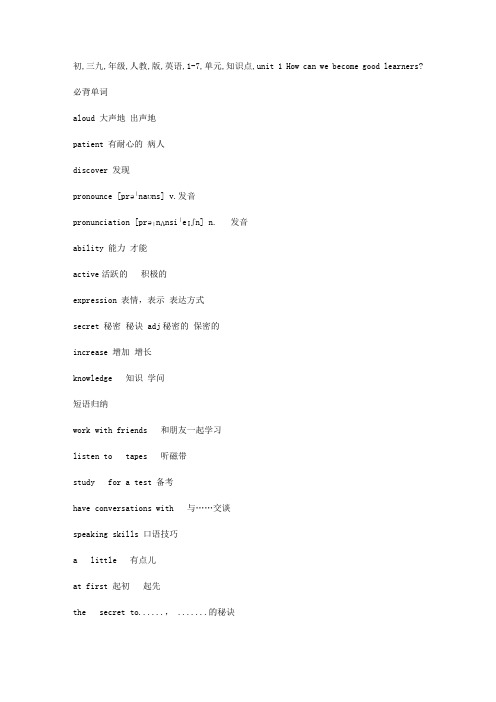
初,三九,年级,人教,版,英语,1-7,单元,知识点,unit 1 How can we become good learners? 必背单词aloud 大声地出声地patient 有耐心的病人discover 发现pronounce [prəˈnaʊns] v.发音pronunciation [prəˌnʌnsiˈeɪʃn] n. 发音ability 能力才能active活跃的积极的expression 表情,表示表达方式secret 秘密秘诀 adj秘密的保密的increase 增加增长knowledge 知识学问短语归纳work with friends 和朋友一起学习listen to tapes 听磁带study for a test 备考have conversations with 与……交谈speaking skills 口语技巧a little 有点儿at first 起初起先the secret to......, .......的秘诀because of 因为as well 也look up (在词典中等)查阅;抬头看so that 以便,为了the meaning of ……的意思make mistakes 犯错误talk to 交谈depend on 依靠依赖in common 共有的pay attention to 注意关注connect ……with ……,把……和……联系或连接起来for example 例如think about 考虑even if 即使尽管纵容look for 寻找find out 找到查明worry about 担心担忧make word cards 制作单词卡片ask the teacher for help 向老师求助read aloud 大声读spoken english 英语口语give a report 作报告word by word 一字一字地so……that如此……以至于fall in love with 爱上something interesting 有趣的事情take notes 记笔记how often 多久一次a lot of 许多the ability to do sth. 做某事的能力learning habits 学习习惯be interested in 对……感兴趣get bored 感到无聊be good at 在……方面擅长be afraid of 害怕each other 彼此互相instead of 代替而不是用法集萃by doing sth 通过做某事it +be+adj+to do sth 做某事是……的finish doing sth 完成某事what about doing sth?做某事怎么样?try to do sth 尽力做某事the +比较近,the+比较近越……,就越……find it+adj+to do sth 发现做某事be afraid of doing sth 害怕做某事help sb (to) do sth 帮助某人做某事practice doing sth 练习做某事keep doing sth 一直做某事be afraid to do sth 害怕做某事begin to do sth 开始做某事want to do sth 想要做某事need to do sth 需要做某事remember to do sth 记得做某事shoot 射(射着,射死等表结果)shoot at(瞄准)射语法全解1、 how询问方式、方法,意为“怎样、如何”。
- 1、下载文档前请自行甄别文档内容的完整性,平台不提供额外的编辑、内容补充、找答案等附加服务。
- 2、"仅部分预览"的文档,不可在线预览部分如存在完整性等问题,可反馈申请退款(可完整预览的文档不适用该条件!)。
- 3、如文档侵犯您的权益,请联系客服反馈,我们会尽快为您处理(人工客服工作时间:9:00-18:30)。
人教版九年级上册英语Unit1-7重点知识复习【重点语法】一、宾语从句宾语从句三要点:从句是陈述句,引导词用___________,也可以省略。
1.引导词从句是一般疑问句,引导词用___________或___________。
从句是特殊疑问句,引导词用___________中的疑问词I know that the Water Festival is really fun.I wonder if they’ll have the races again next year.I don’t know who our new teacher is.2.语序从句用陈述语序即:引导词+主+谓I don’t know who our new teacher is.3.时态主句是一般现在时态,从句时态___________主句是一般过去时态,宾语从句时态要与主句时态保持___________从句表示客观真理,用一般现在时。
I think the young man is Bob’s brother.------I thought the young man_______________________二、感叹句:感叹句由how或what引出三、被动语态(一般过去时的被动语态)基本构成:______________________________肯定句:The computer was invented in 1976.否定句:________________________________________一般疑问句及回答:____________________________________________________________【重点词】1、辨析 spend pay cost takespend的句型:sb spend + 一段时间/钱 + on sthsb spend + 一段时间 + (in) doing stncost的主语一般只能是物例如:只能说,The pen cost me 10 dollars.take的句型:It takes sb + 一段时间 + to do sth. sth take sb + 一段时间pay的句型:sb pay + 钱 + for sth sb pay + 钱 + to sb pay 的主语一般为人2、used to的用法used to十动词原形,意为“过去常干……”eg:He used to be a doctor. 他过去是一位医生。
[拓展]be /get used tobe /get used to-f-名词、代词或动名词,表示“习惯(做)某事”。
used to do sth.的否定形式:usedn’t to do sth.主语+ used not to do sth.didn’t use to do sth.used to do的疑问形式及其答语:(1)Used+主语+to do...?回答:Yes,sb. used to./No,sb. usedn’t to.used to也可用于there be结构,表示“过去常有”eg:There used to be a meeting every Monday morning last month .【课堂练习】一、单选选择()16、--- do you improve your English? ---By listening to tapes and reading aloud.A. HowB. WhyC. WhoseD. When()17、He was so when he heard the news that he got the first prize in the contest.A. exciting, excitingB. exciting, excitedC. excited, excitedD. excite d, exciting ()18. Paper is made___wood and desks are made___wood too.A. of, byB. of, intoC. from, ofD. from,by()19、Do you know Zunyi or not tomorrow?A. whether are they leaving forB. whether they are leaving forC. if they are leaving forD. if are they leaving for()20、I bought two pens. One is black, is red.A. otherB. othersC. anotherD. the other()21、My mother spent two hours the housework yesterday.A. to doB. doC. doingD. did()22、Before 2003, there was no direct airline Taiwan and mainland.A. alongB. inC. betweenD. at()23、Our country a lot in the last few years.A. changesB. changedC. will changeD. has changed()24、Her son Coke, but now he milk.A. used to drink, is used to drinkingB. used to drinking, drinksC. is used to drinking, used to drinkD. is used to drink, is drinking()25、She is a girl with two big eyes.A.six-years-oldB. six-year-oldC. six years oldD. six year old()26、Sanya is famous its beautiful beaches.A. ofB. forC. asD. in()27、The mountain with snow all year round, so it’s hard to climb it.A. coveredB. was coveredC. is coveredD. covers()28、It took Janet three hours reading this interesting story.A. to finishB. finishedC. finishingD. finishes()29、Both your brother and your sister listening to music.A. areB. isC. amD. be()30、The fruit salad tastes delicious. Could you tell me ?A. where to do itB. when to do itC. what to doD. how to do it【课后练习】一、完形填空(15分)My parents had some strange rules whe n my sister and I were growing up. For exam ple, they never __31__ us soda or juice. Our choice was water or iced tea __32_ sugar . My mom’s __33__ for it was that she didn’t like kids who only drank sweet drinks, o r worse, kids who did not like _34__. She wanted to teach us to like water or ___35__ unsweetened drinks that did not come in a bottle. We, on the other hand, wanted to __ 36__ a coke when we ate out. Now I can make my own decisions, but I __37_ choose juice or soda. I don’t __38___ it. It’s not because I don’t like it. I’m just used to drinki ng water. Many people __39___ to think that a kid needs juice. If the child can’t get it, he or she will secretly buy this kind of drink elsewhere. I found this really ___40__ si nce I was raised ___41_ no juice or soda, and I didn’t really ___42_ only having water.Now people _43_ kids to make their own choices, __44_ I grew up in a family where the parents seldom(很少) ___45__ for their children’sopinions, and they made the final decisions.31. A. needed B. sold C. bought D. left32. A. with B. of C. off D. without33. A. decision B. reason C. hobby D. experience34. A. soda B. juice C. water D. milk35. A. another B. the other C. others D. other36. A. order B. reply C. obey D. achieve37. A. ever B. never C. always D. sometimes38. A. think about B. take care C. pay for D. think out39. A. enjoy B. seem C. study D. get40. A. excited B. difficult C. interesting D. necessary41. A. on B. with C. by D. for42. A. give up B. care about C. take pride in D. agree with43. A. allow B. design C. teach D. cause44. A. as B. since C. but D. though45. A. added B. asked C. influenced D. regarded二、阅读理解AIn the last few years, some researchers have decided to study why kids lie(撒谎),So they made up a special team of 12students,all under the age of 21.Each student was given 36 cards, and each card listed a topic that teens sometimes lie about to their parents ,The researchers worked through the cards with the teens, learning what things the kid was lying to his parents about ,and why.By the end of the interviews, the kids saw for the first time how much they were lying and how many of family’s rules they had broken. It was reported that 98% of the teens had lied to their parents.Out of the 36 topics, the average(平均) teen was lying to his parents about 12 of them. The teens lied about what movie they went to, and whom they went with .They lied about how they spent their afternoons while their parents were at work, and something like that.Most parents hear their child lie and think he’s too young to understand what lies areor that lying’s wrong. T hey believe their child will stop, when he gets older .Many books also advise parents to just. let lies go—they’ll grow out of it .But the truth is that kids grow into it. In studies where children are observes(观察) in their natural environment, a 4-year-old child will lie once every two hours ,while a 6-year-old child will lie about once every hour and a half.( )47. The researchers started the project by .A. playing cardsB. free talkingC. doing a survey( )48. The topics on 36 cards are mostly between kids and .A. parentsB. teachersC. researchers( )49. From this passage, the teens lied on about of the 36 topics as an average.A. 12%B. 33%C. 98%( )50. On this topic, the advice from many books for the parents is that they .A. needn’t worry about it too muchB. should take it serious enoughC. had better do something to stop it( )51. According to the studies, children tell lies as they get older.A. lessB. moreC. noBJune 12thFour girls were at the same school. They were good friends, so they often studied and played together. They went to school every day by taxi.One day one of the girls said, “There is a test this morning. Let’s go to school late. Then we won’t have to take the test.”“What can we tell the teacher?” One of the girls said. “He’ll be angry. We’ll need a good excuse.”The girls thought for several moments, then one of them said, “Let’s tell him that our taxi had a flat tire(爆胎).”“That’s a good idea,” the other girls said. “We’ll tell him that.”They arrived at school an hour later. The test was finished.“Why are you late?” the teacher asked. “You miss the test.”“Our taxi had a flat tire,”one of the girls said.The teacher thought for a moment, then he said, “Sit down, one of you in each corner of the room.” The four girls did this. Then the teacher said, “Write the answer to this question on a piece of paper: Which tire was flat?”( )51. The four girls went to school every day by ______.A. busB. taxiC. subway( )52. There was ______ that morning.A. a testB. no classesC. a trip( )53. One day the four girls were late for school because ______.A. they didn’t like the teacherB. there was a car accidentC. they planned to miss the test( )54. We can know from the passage that the teacher ______.A. thought they were good studentsB. didn’t believe what they saidC. gave his students too many tests。
